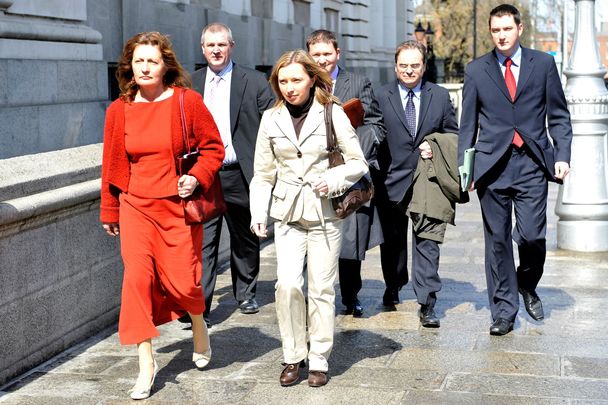The Troubles-legacy case involving the 1989 murder of Solicitor Patrick Finucane is back in the news thanks to reports issued in September and October.
One is on an investigation into the homicide mandated by the 2001 Weston Park Agreement, and the other reports on his family’s quest for an independent, public inquiry.
Finucane was one of a small group of lawyers who defended individuals charged with terrorism offenses in Northern Ireland’s Diplock [non-jury] courts. He represented Bobby Sands and handled broader issues related to interrogation procedures and police abuse. He brought cases before the European Court of Human Rights in Strasbourg.
A month before the murder, MP Douglas Hogg took the floor of the House of Commons and asserted that a number of solicitors in Northern Ireland were “unduly sympathetic to the cause of the IRA,” effectively placing a bulls-eye on lawyers who dared to represent members of the IRA.
Two masked members of the Ulster Defense Association (UDA), a loyalist paramilitary organization, executed Finucane in his Belfast home in the presence of his wife and children. He was shot 14 times; his wife was wounded. No one has been convicted of the heinous crime.
A BBC Spotlight program broadcast this month reported that the British security service (M15) took hard drives from a computer in the office of former Canadian Chief Justice Peter Cory, while he was investigating “collusion” in multiple matters including the Finucane case. M15 wiped the hard drives clean to keep the identity of informers secret. Cory did not complain about this interference for two reasons. He wanted to avoid a diplomatic controversy, and he had a copy of back-up material.
Read more: One of the most notorious murders of the Troubles not properly investigated finds UK Supreme Court
Chief Justice Cory completed his investigation and issued a report in 2003. He found strong evidence that collusive acts were committed by the Army [Force Research Unit] the RUC [Royal Ulster Constabulary Special Branch] and Security Service [M15].” Cory recommended the government undertake an independent, public inquiry into collusion in the Finucane case.
The British government had committed to undertaking a public inquiry if Chief Justice Cory recommended one, but the government reneged. Instead, British Prime Minister David Cameron appointed Queen’s Counsel (QC) Desmond da Silva to review government files and issue a report on the Finucane homicide. His review was neither public nor transparent, and the process was neither independent nor effective because he had no authority to subpoena witnesses.
QC da Silva made a number of adverse findings of collusive acts by government agents and a failure of government oversight, yet no one was named in his report. When the report was released, the Prime Minister apologized to the Finucane family. But his apology for the “appalling crime” and “shocking collusion” rang hollow because no one was held accountable.
The shortcomings of the process and the report should be considered. Those shortcomings are why the Finucane family continues its quest for a public inquiry, and make the need for one clear.
Da Silva found there was a “shocking” level of “collusion in [Finucane’s] killing,” and “that agents of the state were involved in carrying out serious violations of human rights up to and including murder.” The report stated some members of the RUC and Ulster Defense Regiment leaked information to loyalist paramilitaries “in instances where they shared a commons desire to see republican paramilitaries killed.”
Da Silva also found Brian Nelson - an informant for the Army’s Force Research Unit (FRU) and a member of the UDA - used FRU information to identify targets for loyalist assassination, was significantly involved in targeting Finucane, and “played an important part in the murder” by surveilling his Belfast home and giving his photograph to members of the UDA.
Da Silva found the RUC ignored intelligence about “an imminent [UDA] attack” that “could have prevented Finucane’s murder” if handled properly. Instead, the RUC “took no action whatsoever” to disrupt the attack. Damningly, da Silva also found “on the balance of probabilities that an [unidentified] RUC officer or officers” proposed targeting Finucane to the UDA.
Additional determinations by da Silva show the collusion did not end with the murder. For example, the Army gave investigators “misleading and factually inaccurate” information about their handling of Nelson, and the RUC obstructed multiple investigations by withholding information. The report said, “there was a relentless attempt to defeat the ends of justice.” This is evidence of a cover-up.
Despite all of his findings, da Silva concluded there was “no overarching State conspiracy” involving government ministers. This conclusion absolved high level government officials of dereliction in the performance of oversight responsibilities, and it meant government blindness to the criminal conduct of its agents - whether willful or negligent - went unpunished.
Common sense tells you only one conclusion can be drawn from collusion so all-encompassing it involves “identifying, targeting and murdering Mr. Finucane . . . and deliberately obstructing subsequent investigations.” That is, there existed a high level cover-up among government officials, which points to the existence of a conspiracy.
When released, the Prime Minister said the da Silva report answered all of the questions about the Finucane case and the matter was closed. The government rejected the family’s demand for an independent, public inquiry, and ignored the commitment it made to hold one.
The government announced da Silva’s review would get to the bottom of the “collusion,” and reveal and disclose the “truth” about its “extent and nature.” The report, however, failed to do this. It was less than thorough. The report failed to name government malefactors, those who shirked their supervisory responsibilities, and others who should be held accountable. It raised more questions than answers. Sadly, the full truth about collusion remains hidden.
Read more: John Finucane, son of murdered lawyer Pat elected Mayor of Belfast
Certainly, the process was no substitute for a public inquiry. Finucane’s wife Geraldine criticized the report for doing “exactly what was required to give the benefit of the doubt to the State, its cabinet and ministers, to the Army, to the intelligence services, to itself.” She described it as continuing a cover-up, and said, “[t]he dirt has been swept under the carpet without any serious attempt to lift the lid on what really happened to Pat and so many others.”
In response to the report, the Finucane family went to court to force the government to conduct a public inquiry as promised. That matter was decided earlier this year by the Supreme Court in London. The Court ruled that prior investigations of Finucane’s murder were ineffective and failed to meet the European Court of Human Rights standards.
Thus, earlier investigations including the one handled by QC da Silva were seen by the Court as deeply flawed. The Court also noted the government had given Geraldine Finucane “an unequivocal undertaking” that a public inquiry would be held but failed to follow through on this commitment. The holding was a major victory in the family’s pursuit of truth and justice. But finding the “change of heart on the part of the government” was made in good faith, the Court let the government decide how to proceed.
The second news report came last month. It related to Mrs. Finucane’s ongoing struggle to have the government hold a public inquiry. Since the ruling, according to BBC News, two Northern Ireland Secretaries of State have promised to meet with the Finucane family and their attorneys to discuss the matter and failed to follow through.
With no other option available, Mrs. Finucane has returned to court to enforce the government’s obligation to conduct “a full independent public inquiry with the powers to compel the production of documents and public examination of witnesses.”
Such an inquiry would be independent, effective and human rights compliant. It would disclose the full truth and expose how wide and high the collusive corruption spread and undermined government institutions. More important, it would be a step toward restoring public confidence in the rule of law.
Three decades after the murder of Pat Finucane, that is what justice demands.
This article was submitted to the IrishCentral contributors network by a member of the global Irish community. To become an IrishCentral contributor click here.




Comments